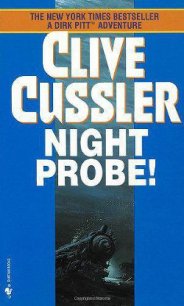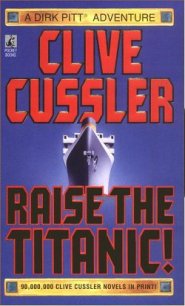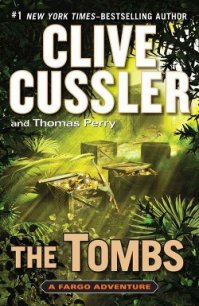The Storm - Cussler Clive (книги без сокращений .TXT) 📗
At another time and place Kurt might have chalked those words up to female hysterics, but as the waves of pain racked every millimeter of his body he thought she might be right.
The speaker shut down and the agony vanished like a rubber band breaking—one instant it was everywhere, the next it was gone.
It left behind fatigue and a feeling of complete and utter exhaustion. Kurt lay on the sand unable to do any more than breathe.
Leilani ran to him and dropped down in the sand beside him.
“Are you okay?” she asked, rolling him over onto his side. “Are you all right?”
He nodded.
“Are you sure?”
“Don’t I look it?” he managed.
“Not really,” she said.
“I am,” he insisted. “I swear.”
“I haven’t known you very long,” she said, helping him to a sitting position, “but you’re really not normal. Are you?”
Even through the exhaustion Kurt had to laugh. He was hoping for something like I don’t want to lose you or I’ve started to care for you or a similar sentiment along those lines.
“What’s so funny?” she asked.
“I really thought you were going somewhere else with that,” he said. “But that doesn’t make you wrong.”
She smiled.
“How far did I get?” It felt like he’d climbed Mount Everest with a heavy pack on his shoulders.
“All of two feet,” she said.
“That’s it?”
She nodded. “The whole thing lasted only a couple of seconds.”
It had seemed like an eternity.
Around them the other beams shut down. Tautog came to see them, arriving as the first undisturbed wave lapped the beach.
“I agree with her,” he said. “You are not even close to normal.”
Kurt felt his strength returning. “Well, as long as we’ve settled that question, my next request shouldn’t come as any surprise.”
Kurt put out his hand. Tautog grabbed it and pulled Kurt up to his feet.
“And what request would that be?”
“I need a boat,” Kurt said, “a dozen rifles and one of these machines.”
“You are planning to rescue your friends,” Tautog guessed.
“Yes,” Kurt said.
Tautog smiled. “Do you really think we will let you go alone?”
CHAPTER 49
SINCE FINDING THE GUARD SHACK AT THE TEMPLE OF Horus, Joe Zavala’s luck had turned decidedly sour.
First, it proved an epic undertaking to get anyone from the military out in the pouring rain to speak with him. When they did come, they arrived with no interpreter, forcing the temple’s part-time security guard to act as the go-between. Despite his valiant effort, Joe was certain that important details were being lost in translation.
With each attempt at clarification, the military men went from looking perplexed to incredulous to annoyed.
When Joe insisted that their delay was only increasing the danger, they began shouting at him and pointing fingers as if he was making threats instead of bringing a warning.
Maybe this was how messengers get themselves shot, Joe thought.
And with that, he’d been hauled out of the guard shack at gunpoint, thrown in the back of a van and driven to a military compound of some kind, where he ended up in the stir Egyptian military style.
The filthy holding cell would have given any germaphobe nightmares. And Joe found little solace in the fact that sooner or later ten trillion gallons of water from behind the shattered dam would sweep in and wash the cell clean.
His luck began to change when the new shift arrived at four a.m. With them came an officer who spoke better English.
Major Hassan Edo wore tawny military fatigues with only a few adornments beyond his name. He was in his mid-fifties, with close-cropped hair, a hawklike nose and a thin mustache that might have been at home on Clark Gable’s face.
He leaned back in his chair, propped his boots up on the enormous desk in front of him and lit a cigarette that he proceeded to hold between two fingers as he spoke, never actually taking a puff.
“Let me get this straight,” the major said. “Your name is Joseph Zavala. You claim to be an American—which isn’t the best thing to be around here these days—but even then you have no proof. You say you’ve entered Egypt without a passport, a visa or any other kind of documentation. You do not even have a driver’s license or a credit card.”
“Without trying to sound overly defensive,” Joe began, “entered Egypt kind of makes it sound voluntary. I was a prisoner, held by terrorists who are intent on severely damaging your country. I escaped, came here to warn you and so far have been treated like some kind of rabble-rouser.”
Receiving a blank stare from the major, Joe paused. “You guys know what a rabble-rouser is, right?”
Major Edo pulled his feet off the desk, landing them on the wooden floor with a heavy clump. He pulled the cigarette from the ashtray, where he’d put it, threatened to actually smoke it for a second and then leaned toward Joe instead.
“You come to warn us of trouble?” he said as if Joe had been hiding that fact.
“Yes,” Joe said. “Terrorists from Yemen are going to destroy the dam.”
“The dam?” Edo repeated with a tone of disbelief. “Aswan High Dam?”
“Yes,” Joe said.
“Have you seen the dam?”
“Only in pictures,” Joe admitted.
“The dam is made of stone, rocks and concrete,” the major said with fervor. “It weighs millions of tons. It’s two thousand feet thick at the base. These men—if they exist—could hit it with fifty thousand pounds of dynamite and they would only take a small chunk out of one side.”
With every phrase, the major waved the cigarette around. Ash flew here and fell there, the thin line of smoke danced, but still the cigarette didn’t go to his lips. He sat back, utterly convinced of himself. “I tell you,” he finished, “the dam cannot be breached.”
“No one said anything about blowing it up from the bottom,” Joe replied. “They’re going to cut a channel across the top, just below the waterline where the dam is narrowest.”
“How?” the major asked.
“How?”
“Yes,” the major said, “tell me how? Are they going to drive backhoes and diggers up on the top and begin an excavation without us noticing?”
“Of course not,” Joe said.
“Then tell me how it is to be done.”
Joe went to speak but stopped with his mouth wide open before uttering a word.
“Yes?” the major said expectantly. “Go on.”
Joe closed his mouth. The way he saw it, he could explain what he knew, telling the major that the dam would be brought down by machines so small no one could see them, and expect only laughter and utter dismissal. Or he could make something up and do nothing but muddy the waters and send the major off looking for a threat different than the one that actually existed.
“Can I make a phone call?” he said finally.
If he could reach the American Embassy or NUMA, he could at least warn someone else of the danger in Aswan and also of the impostor’s presence on the floating island.
“This is not America, Mr. Zavala. You have no entitlement to a phone call or to an attorney or to anything I choose not to give you.”
Joe tried another tactic. “How about this,” he said. “There are five trucks out there. Identical flatbeds, with tarps over the top. They were heading north, carrying yellow barrels in the back, drums filled with a silvery sandlike substance. Find them and detain them, question the drivers. I’m sure you’ll discover they have no visas, passports or credit cards either.”
“Ah yes,” the major said scornfully. He picked up a notepad and scanned it under the harsh lighting.
“The five mystical trucks from Yemen,” he said. “We have been looking for them since you first gave us your story. By air, by car, on foot. There are no trucks out there to be found. Not here. Not in any warehouse large enough to hide them. Not near the dam or on the shore of the lake. Not even on the road back to Marsa Alam. They do not exist except, I think, in your imagination.”




